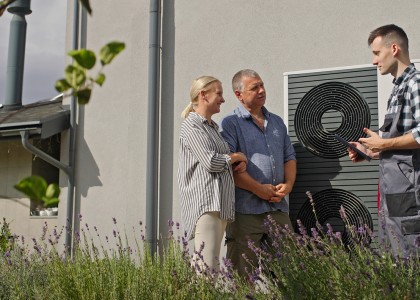The new administration and Congress could seek major cuts to energy-saving programs. ACEEE will work to protect policies and investments that reduce household bills and support U.S. competitiveness.
Across the nation, voters have sent a strong message: Many are frustrated with the high cost of living, including energy expenses. Electricity, gasoline, and heating fuel bills make up a significant portion of household budgets, and energy efficiency programs offer one of the most effective ways to keep these costs in check.
Programs aimed at making homes, appliances, and vehicles more energy efficient directly reduce the amount families and businesses spend on energy. Monthly bills shrink when homes are better insulated and appliances consume less power. When vehicles use less fuel, drivers save at the pump. These are tangible benefits that help American households stretch their budgets further. These policies are also critical for reducing the greenhouse gases that are causing increasingly extreme weather today.
Unfortunately, some policy proposals touted in the campaign could put these benefits at risk. President-elect Donald Trump has signaled plans to roll back auto standards he claims are electric vehicle mandates and to rescind unspent funds from the Inflation Reduction Act (IRA), which provides numerous incentives to help Americans reduce their energy costs. Repealing these programs would directly increase energy consumption, driving up utility and transportation expenses at a time when reducing the cost of living is more critical than ever.
News reports indicate that the new administration and Congress may address some of these proposals in their first 100 days as part of a bill to extend Trump’s 2017 tax cuts and reduce spending. With a narrow Republican majority likely in the House of Representatives, the votes of Republicans in moderate districts could be determinative.
Rolling back efficiency programs would raise costs for families
Energy efficiency programs launched through the IRA are already making a difference. This landmark legislation has introduced incentives that help families upgrade their homes with efficient appliances, add better insulation, and access clean energy sources—all of which help cut down monthly bills. These incentives include rebates that are specifically designed to help middle- and lower-income households make cost-saving improvements. These mean lower costs for electricity, heating, and cooling, which can add up to significant savings each year.
However, repealing the IRA or eliminating existing efficiency standards would blunt or reverse these savings. If vehicle efficiency standards are rolled back, for example, consumers will end up paying more at the pump as they drive less-efficient cars. The same is true for electricity: Without appliance and equipment efficiency standards, electricity demand would rise, increasing utility bills for households and businesses. Eliminating these programs would transfer costs to American families and make it harder for them to manage daily expenses.
Energy efficiency boosts U.S. competitiveness—we can't afford to fall behind
Energy efficiency isn’t just a solution for today’s household budgets; it’s also an investment in the nation’s long-term economic health. The United States faces strong competition in global markets, especially in industries such as manufacturing, transportation, and technology. Policies that support energy-efficient technologies help strengthen and expand American manufacturing by reducing production costs and making U.S. products more competitive in global markets.
The IRA has already spurred billions of dollars in investments, particularly in manufacturing facilities that produce energy-efficient next-generation technologies, advanced batteries, and clean energy components. Key programs include the Industrial Demonstrations Program and the Advanced Energy Project Credit program. Many of these factories are located in the Southeast, Midwest, and Southwest, providing well-paying jobs. Rolling back the IRA would undercut these investments and slow the progress toward making the United States a leader in advanced manufacturing and clean energy. The stakes are high: If the United States abandons these programs, it risks falling behind other nations that are investing in the industries of the future.
Moreover, the policies being proposed could actually compound the damage from inflation. Markets are already reflecting concerns that tariffs, tax cuts, and other proposed policies could increase inflation; cutting energy efficiency investments would amplify these concerns by increasing energy use and energy bills.
ACEEE will continue fighting for lower energy costs
As we look ahead, ACEEE is committed to working with policymakers at the federal, state, and local levels to defend and advance energy efficiency. Our goal is to help American families lower their bills, make U.S. businesses more competitive, support economic resilience, and combat climate change. We are partnering with state and local governments to develop and implement programs—sometimes with federal funding—with a proven track record of reducing costs and improving energy efficiency across buildings, transportation, and industry.
States are making strides in energy efficiency, creating examples for the rest of the country to follow. For instance, several states, localities, and utilities have launched successful programs to retrofit homes and commercial buildings, reducing energy use while creating jobs in local communities. ACEEE is proud to support these efforts and will continue to promote state-level and local policies that offer practical, cost-saving solutions.
In Washington, we’ll be working with members of Congress on both sides of the aisle to ensure they understand the importance of maintaining efficiency programs that deliver relief from high costs while building a more sustainable future. If policymakers roll back these programs, they risk alienating voters looking for solutions to high energy prices and inflation.
In addition to the programs discussed above, we will also seek to defend tax incentives for efficient new homes and building code standards adopted by the Housing and Agriculture Departments that reduce energy bills for homebuyers, including many purchasing their first home. It is much less expensive to increase the efficiency of new homes when they are constructed than to have to undertake retrofits later. Likewise, tax credits for efficient, low-emissions trucks remain important, as these reduce particulate and nitrogen oxide emissions that are harmful to health and disproportionately impact low-income communities.
We will also look to opportunities for progress with the new administration and Congress on issues such as industrial competitiveness, affordable housing, the overdue farm bill, and the transportation reauthorization bill (due in 2026).
A path forward for affordability and competitiveness
Improving energy efficiency is a cornerstone of a stable, competitive, affordable American economy. Protecting and expanding energy efficiency programs is one of the best ways to ease the financial burdens on American households while ensuring that our nation remains competitive on the global stage. In addition, these programs reduce greenhouse gas emissions, a priority for many states, and one that will likely return to the national agenda in the future.
ACEEE will continue to advocate for policies that lower costs, create sustainable jobs, and support American innovation. By working with policymakers, community leaders, and advocates, we can reduce energy bills and build a more resilient economy for future generations.




